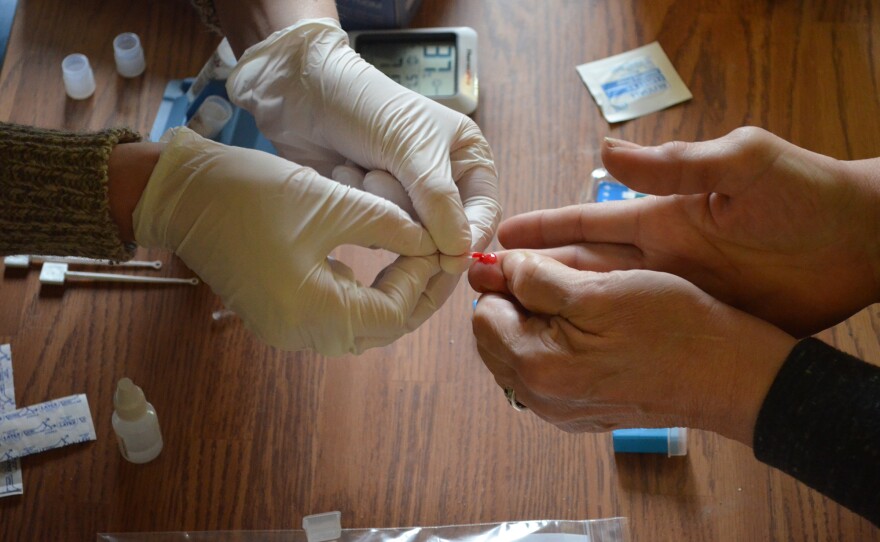Public health researchers believe illegal needle exchanges are reducing transmission of hepatitis c in Iowa. Advocates hope the data will help build support for legalizing the practice in the state.
According to data from the Iowa Department of Public Health, confirmed cases of hepatitis c in Iowans under 40 have dropped 27 percent since 2016. That's a reversal of what's been a generally upward trend over nearly two decades.
In 2000, there were 36 confirmed cases of the disease in patients under 40. The number of cases hit 479 in 2016, then dropped to 348 in 2017. Researchers at the IDPH's Bureau of HIV, STD and Hepatitis believe that reversal is due to the work of underground needle exchange programs.
"The only thing we know that's different is underground needle exchange is going on in the state. That's the only variable that we can find after analyzing the data over and over and over." - Nicole Kolm Valdivia, Iowa Dept. of Public Health
When researchers first looked at the numbers, Data Program Manager Nicole Kolm Valdivia said they assumed there was some mistake.
"When you see this you think there's something wrong. Did we analyze the data wrong? Is there a lab that's not reporting information? And we did all these analyses, we looked at everything," she said.
But after running the numbers mutliple times, Valdivia said she believes the public health programs led by the Iowa Harm Reduction Coalition and other groups are making the difference.
"The only thing we know that's different is underground needle exchange is going on in the state," she said. "That's the only variable that we can find after analyzing the data over and over and over that seems to be affecting this rate."
Founded in 2016, the Iowa Harm Reduction Coalition aims to make drug use safer. The volunteer-run group helps distribute clean needles and other injection supplies, provides overdose reversal drugs, refers users to social services like drug treatment centers and homeless shelters, and tests users for conditions that can spread through IV drug use, like HIV and hepatitis c virus or HCV.
According to the IDPH, 23,588 Iowans have ever been diagnosed with HCV, though researchers say many cases likely go undiagnosed. The number of Iowans dying of the viral liver infection has steadily climbed since 2006.
Patients under the age of 40 are more likely to transmit the disease, oftentimes through shared needles. According to the IDPH, 75 percent of HCV patients under 40 reported IV drug use. Advocates say that makes the decrease in transmissions, and the efficacy of needle exchange programs, that much more impactful.
"It really is these peer users...peer counselors that are able to really effectively partner and get this into the hands of people who can use it." - Daniel Runde, Iowa Harm Reduction Coalition
Emergency physician Daniel Runde co-chairs the IHRC's board of directors. He says even relatively small investments by volunteer-run non-profits can make a difference.
“Think about how limited that is, how small a group of people that is, in a few communities. And if you can see that kind of impact…And I can tell you the budget that those organizations are working with is a tiny fraction of what we’re using,” he said.
While the IHRC counts a number of physicians and medical professionals among its members, Runde says the most effective outreach is being conducted by people who are actively using drugs or were recently using.
“It really is these peer users…peer counselors that are able to really effectively partner and get this into the hands of people who can use it,” Runde said.
Runde says needle exchanges save lives and prevent expensive infections. HCV can be deadly. But recently-developed treatments are incredibly successful, curing up to 98 percent of patients, but at a staggering financial cost, putting care out of reach for many. Advocates say harm reduction efforts like legalizing needle exchange programs and making clean injection supplies widely available are key to preventing a public health crisis.
"I think it's all the more reason to get people on board with this," Runde said. "We could for the cost of treating ten people supply most of the state with clean supplies and make them accessible and available."
A bill aimed at legalizing needle exchanges in Iowa died last session. Opponents and skeptics worry the programs could encourage drug use, though researchers dispute that. Still, public health advocates say they’ll be back in the capitol next year pushing for legalization.









